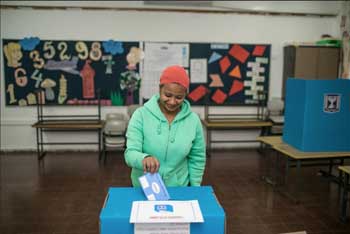Media Confounds, Calling Israel’s Voting Arab Citizens ‘Palestinian’

The impressive turnout on the part of Arab citizens of Israel in last week’s elections — making the Joint List of Arab parties the country’s third largest party and placing it in position to lead the opposition — garnered significant media coverage. Some media outlets, unfortunately, provided confusing coverage by insisting on referring to Israel’s Arab voting population as “Palestinians,” despite the fact that they are Israeli citizens, they do not reside in Palestinian controlled areas, and the overwhelming majority of them do not identify as Palestinian.
Particularly in the context of Arab citizens exercising their right to vote in Israeli elections, the “Palestinian” label is unjustified and misleading.
In The New York Times, for example, bureau chief David Halbfinger confounded:
Mr. [Ayman] Odeh’s ads practically beg Palestinian citizens to vote on Tuesday, saying that one million citizens, if they all voted, would translate into 28 seats in the Knesset. . . .
Indeed, such misleading nomenclature for Arab citizens of Israel confuses them with Palestinians — Arabs who live in Palestinian-controlled territories and who do not hold Israeli citizenship. For example, in the same article, Halbfinger refers to “Israel’s treatment of the Palestinians living under the occupation” and also to an Instagram photo of an “iconic Tel Aviv skyscraper with its facade displaying the Palestinian national flag.” How are all but the already well-informed readers meant to unpack this terminology, and distinguish between the voting “Palestinians” versus Arabs in the West Bank or Gaza who are not Israeli citizens?
Indeed, NPR’s Daniel Estrin seems to recognize the problem with referring to Israel’s Arabs as “Palestinian” even as he does so. He refers to “Palestinian Arab citizens of Israel” but then feels compelled to clarify:
And another thing to note here is that the party representing Palestinian Arab citizens of Israel – I’m not talking about the Palestinians of the West Bank and Gaza, they don’t have voting rights in Israel – but the Arab party is poised to be the third-largest party in the Parliament.
Besides confusing uniformed news consumers, referring to Israel’s Arabs as “Palestinians” does not reflect how the vast majority self-identify. A poll released this week by the Guttman Center for Public Opinion and Policy Research at the Israel Democracy Institute found that 13 percent of Israeli Arabs identify primarily as Palestinians. As Haaretz reported:
Nearly two-thirds (65 percent) of Arab citizens said they were proud to be Israelis – the highest rate since 2003. Asked how they self-identify, 38 percent said as Arab, 36 percent said by religion (Muslim, Christian or Druze), 13 percent said as Palestinian and 9.5 percent said as Israeli.
More from SNAPSHOTS
CNN’s Amanpour Condemns “power grab” By Israel’s Prime Minister and Others
April 1, 2020
We’ve said it often, but it’s worth repeating: Anyone interested in reasonably unbiased information about Israel (at least) should avoid the broadcasts of CNN’s Chief International Correspondent and Anchor, Christiane Amanpour. In characterizing responses to [...]
Seattle Media Oblivious To Imam’s Hateful Indoctrination Condemning Jews
January 7, 2020
The Masjid Ar-Rahmah mosque teaching – that Allah transformed Jews into apes and pigs for disobeying him – delivered by Imam (prayer leader) Mohamad Joban – was posted online by mosque personnel. This December 2019 [...]
AP Distorts: Bethlehem ‘Almost Completely Surrounded’
December 10, 2019
Over two years after improving inaccurate language falsely citing Israel's security "barrier surrounding the biblical city" of Bethlehem, the Associated Press once again misrepresents. AP's Joseph Krauss and Mohammad Daraghmeh wrote yesterday ("Palestinians in Bethlehem [...]
Reuters Errs on Administrative Detention For ‘Anti-Israel Activity’
November 5, 2019
The Ofer Prison, near Ramallah (Photo by Tamar Sternthal) A Reuters article today egregiously misrepresents administrative detention, erroneously asserting that it is mainly applied to "Palestinians suspected of anti-Israeli activities," when in fact the Israeli [...]


